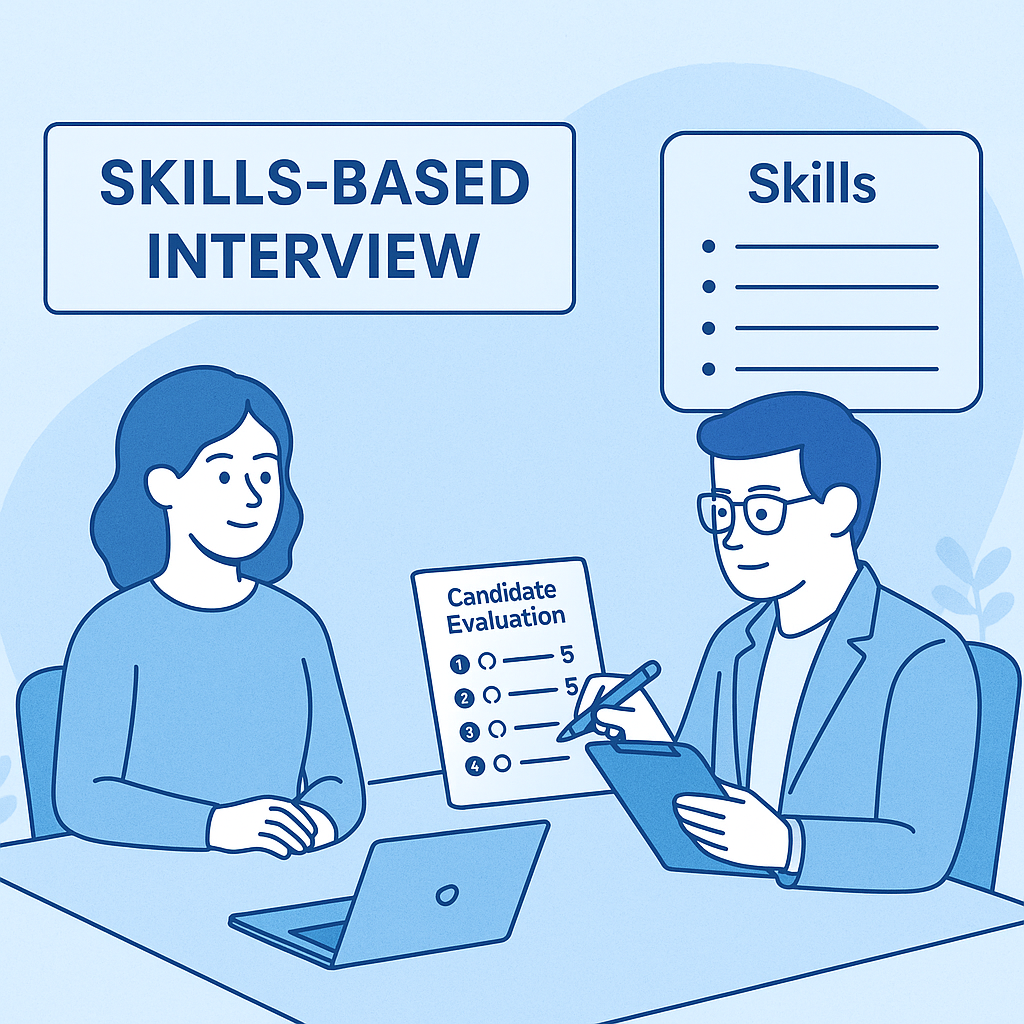Skills-Based Interviewing: A Smarter Way to Assess True Candidate Potential
What is Skills-Based Interviewing?
Skills-Based Interviewing is a hiring approach where the evaluation of candidates is primarily based on their demonstrated abilities and competencies rather than educational background, previous job titles, or years of experience.
This method focuses on assessing real-world skills that are directly relevant to the role through structured questions, practical exercises, and evidence-based evaluation.
Skills-based interviewing complements modern practices like Skills-Based Hiring and Structured Interviews, helping companies select the best candidates based on what truly matters: their capability to perform the job successfully.
Why Skills-Based Interviewing Matters
In today’s rapidly evolving job market, skills are a better predictor of job success than traditional credentials. Here’s why skills-based interviewing is critical:
Promotes Fairness and Diversity
By focusing on actual abilities, it reduces bias tied to education, employment history, or demographics, improving the Candidate Experience.Enhances Predictive Validity
Skills tests and structured competency-based questions provide better insights into future performance.Opens the Talent Pool
Candidates from non-traditional backgrounds gain opportunities they might otherwise miss.Improves Job Fit and Retention
Hiring based on skills ensures new hires are better aligned with the role’s requirements, reducing turnover.

Key Elements of a Skills-Based Interview
An effective skills-based interview typically includes:
Element | Description |
|---|---|
Competency Framework | Define the specific skills required for the role, linked to the Job Requisition. |
Behavioral Questions | Ask candidates to describe real-world experiences where they demonstrated relevant skills. |
Practical Exercises | Assign tasks or case studies that mirror on-the-job challenges. |
Standardized Scoring | Use a Candidate Evaluation Form or scorecard to objectively rate each skill demonstrated. |
Clear Feedback | Document observations and scoring immediately after the interview to maintain accuracy. |
How to Conduct a Skills-Based Interview
Here’s a step-by-step guide:
Identify Critical Skills
Analyze the role and determine the essential hard and soft skills required for success.Design Skills-Based Questions and Tasks
Develop behavioral interview questions (e.g., “Describe a time you led a project under a tight deadline.”) and practical exercises relevant to the role.Standardize Your Process
Implement a Structured Interview format where all candidates are evaluated against the same skill set.Use a Clear Scoring Rubric
Predefine rating scales (e.g., 1-5) for each skill area to ensure fairness and consistency.Provide Immediate Feedback
After the interview, quickly record evaluations using a digital Candidate Scorecard or internal system.
Example Skills-Based Interview Questions
Problem-Solving:
“Can you describe a situation where you identified a major problem and successfully solved it?”Communication:
“Tell me about a time you had to explain a complex idea to a non-expert audience.”Leadership:
“Give an example of how you motivated a team to achieve a challenging goal.”Technical Expertise:
“Walk me through how you would troubleshoot a system error in your previous role.”
Best Practices for Skills-Based Interviewing
Prioritize Real-World Scenarios
Use situational or past behavior questions linked to actual job tasks.Stay Consistent Across Candidates
Apply the same questions and evaluation criteria for every interviewee.Focus on Evidence, Not Assumptions
Base scores on what candidates say and do, not on impressions or assumptions.Combine Skills Interviews with Work Samples
Whenever possible, ask candidates to perform a small task related to the job.
FAQ: Skills-Based Interviewing
Q1: How is skills-based interviewing different from traditional interviews?
A1: Traditional interviews often prioritize resume credentials, while skills-based interviewing focuses on actual job-related abilities.
Q2: Is skills-based interviewing suitable for all roles?
A2: Yes, especially for technical, customer-facing, and operations roles where performance depends heavily on practical skills.
Q3: Can skills-based interviewing be automated?
A3: Yes, many Applicant Tracking Systems (ATS) and interview platforms support skill-based assessments, structured questions, and automated scoring.
Conclusion
Skills-Based Interviewing revolutionizes the hiring process by shifting the focus from backgrounds to capabilities.
By standardizing evaluations, removing biases, and targeting real-world skills, organizations can unlock access to a more diverse, capable, and loyal workforce.
As talent markets grow more competitive, adopting a skills-first approach is not just a trend—it’s a strategic necessity for building future-ready teams.
HR Glossary: Master the Language of Modern HR
From recruiting candidates to onboarding new team members, MokaHR gives your company everything you need to be great at hiring.
Subscribe for more information

